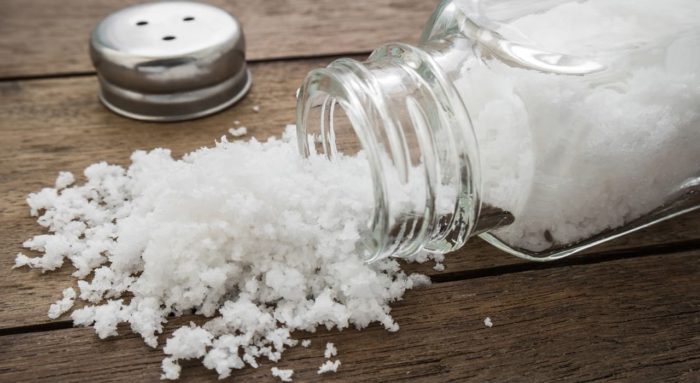By Harriet Mallinson | Published on April 19, 2017
Alarming research has proved that not only do many of us have no idea how much salt we should consume in a day, but excess intake of the mineral is causing a shocking 14,000 preventable deaths each year.
A survey by Consensus Action on Salt and Health (CASH) based at Queen Mary University of London, UK, has shown that out of 28 food groups, only the “bread rolls†category has so far met the 2017 maximum, but not the average, salt target.
For instance, Galaxy Ultimate Marshmallow Hot Chocolate (0.8g salt per serving) has a whopping five times more salt (per 100g) than the maximum salt reduction target for beverages. You’d never guess from the sweet taste but one serving is saltier than a bag of crisps, the study found.
Why is salt so bad?
Salt raises our blood pressure as it makes the body retain water. The more salt we eat, the higher our blood pressure. “It is this rise in blood pressure that leads to thousands of unnecessary deaths worldwide from heart attacks, heart failure and stroke,†says Sarah Alderton, Nutritionist at CASH.
“Raised blood pressure is responsible for almost 62% of stroke and 49% of heart disease. High salt intake can also contribute to kidney disease, stomach cancer and osteoporosis, and salt can also have an indirect effect on obesity.”
The product survey, which was conducted using the new and updated FoodSwitch UK app and its SaltSwitch filter, compared two shopping baskets each containing similar everyday food items, but with different amounts of salt.
The difference in salt content between the “unhealthy†and “healthy†baskets of products was a staggering 60g of salt.
What do the experts think?
Professor Graham MacGregor, Professor of Cardiovascular Medicine at Queen Mary University of London and Chairman of CASH says: “This is a national scandal. The UK was leading the world in salt reduction, but Public Health England is doing nothing to ensure that the 2017 salt targets are met.
“The National Institute for Health and Care Excellence clearly demonstrated the huge cost savings for the National Health Service of salt reduction; for example, 1g reduction saves £1.5 billion per year, at a cost of less than half a million pounds a year.
“PHE should seize this opportunity and ensure the 2017 targets are met, as well as setting new mandatory targets for 2020, to ensure that we continue to lead the world and save the maximum number of lives.â€
– RELATED: 14 Small Dietary Changes That Lead To Major Results –
Should we know more?
A lack of knowledge among the public is also worrying, with a separate independent national poll revealing that only 40% of people know that a teaspoon (6g) of salt is the maximum amount of salt you should have in a day. Meanwhile, nearly a quarter of the population are unsure what the correct answer is.
The food items that contribute the most to our salt intake are also a blurry topic for many people, with 30% blaming ready meals, including store bought pizza, 16% saying crisps and other savoury snacks and 10% believing it’s salt added to food when cooking.
However, the real culprits are in fact bread and cereal products, which contribute nearly a quarter of the salt in the UK’s diet.
This signals that PHE are failing to educate the public about the risks they’re running in eating too much salt as over half of respondents believe it should be the responsibility of the food industry to proactively reduce salt content in their products.
Is there hope?
CASH’s shopping basket analysis reaffirms the public health goal of consuming no more than 6g salt per person per day (i.e. just over 1tsp salt per person/day) is achievable, yet manufacturers are dragging their heels.
By dithering, PHE are wasting a very cost-effective opportunity to prevent 14,000 deaths every year, by reducing salt intakes from the current 8g to the recommended 6g, which is predicted to save the NHS a further £3billion a year.
With less than nine months to go for food manufacturers and retailers to meet the 2017 Salt Reduction Targets, action must be taken, insist nutritionists.
For more articles on health and nutrition news sign up to the Macros newsletter.
Harriet is Editor of MACROS and perfectly capable of eating an entire log of goat’s cheese in one sitting.

